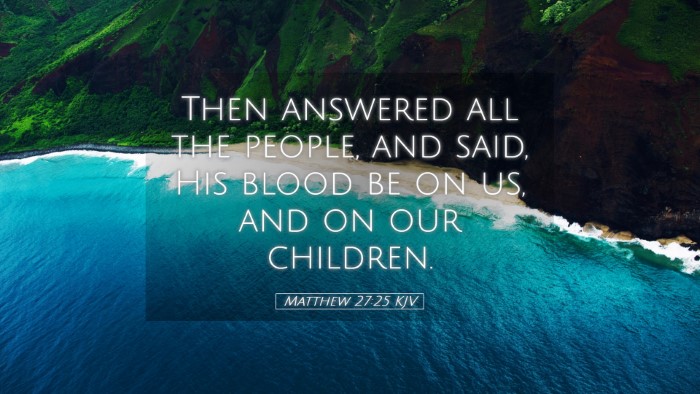Commentary on Matthew 27:25
Text of Matthew 27:25 (ESV): "And all the people answered, 'His blood be on us and on our children!'
Introduction
This verse is one of the most significant and profound statements found in the New Testament, encapsulating the moment of Jesus' trial before Pilate and the profound implications of the crowd's declaration. As we examine this passage, we will draw insights from renowned public domain commentaries, including those of Matthew Henry, Albert Barnes, and Adam Clarke.
Contextual Examination
Matthew 27:25 occurs in the context of Jesus being delivered to be crucified. The priests and elders had stirred up the crowd to demand the release of Barabbas and the crucifixion of Jesus. In this moment of collective decision-making, the multitude, representing the Jewish people of that time, vocalized their acceptance of responsibility for the blood of Christ.
Interpretation and Themes
- Collective Responsibility:
Matthew Henry notes that this statement reflects the collective guilt of the people. Their demand for Jesus' crucifixion and acceptance of His blood shows a tragic recognition of the gravity of their decision.
- Covenant Consequences:
Albert Barnes discusses the implications of the curse the people invoked on themselves, recognizing it as a foreshadowing of the judgment that would come upon Jerusalem. The blood they accepted would indeed have far-reaching consequences, culminating in the destruction of the temple and the city in AD 70.
- Spiritual Blindness:
Adam Clarke emphasizes the blindness of the people in that moment. They did not realize the magnitude of their words; they were blinded by malice and misunderstanding. Their proclamation was one of profound ignorance regarding the nature of the Messiah.
- Generational Implications:
The phrase "and on our children" indicates a willingness to accept not only personal guilt but also the consequences for future generations. This aspect raises ethical and theological questions about the guilt of the father being passed onto the children, which is addressed at different points in Scripture (Ezekiel 18:20).
Theological Reflection
This verse has profound theological implications that warrant reflection:
- Jesus as the Suffering Servant:
The crowd's acceptance of Jesus' blood as their own is indicative of a deeper spiritual truth. In Christian theology, Jesus' death is understood as vicarious atonement, suffering not just for the sins of the people present but for the sins of humanity.
- Judgment and Mercy:
Despite the seemingly harsh acceptance of guilt, the story does not end in despair. There remains the possibility of redemption and mercy, as highlighted in other parts of Scripture where repentance leads to forgiveness, such as in the promises contained in the New Covenant.
- Reflecting on Our Own Guilt:
Pastors and theologians might reflect on their application of this passage. The question remains – how often do we, as modern believers, take responsibility for our actions and the state of our spiritual community? This extends beyond historical interpretation to personal application in today’s church.
Conclusion
Matthew 27:25 encapsulates a moment heavy with meaning, filled with the weight of collective decision-making and the foreshadowing of events to come. As we study this passage, we are reminded of the gravity of sin and the profound mercy that God extends through Jesus Christ. The reflections from historic commentaries offer a well-rounded understanding, inviting us into a deeper contemplation of our faith and the ongoing implications of rejecting or embracing the sacrifice of Christ.


